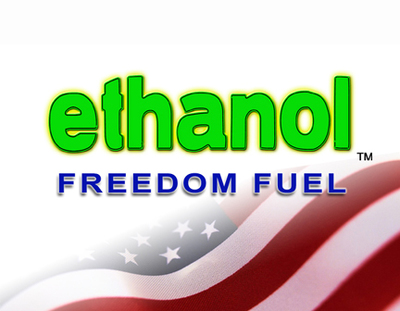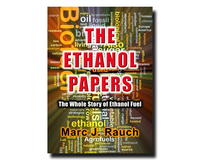EPA's E15 Hearing Features Outdated Lies and Over-Exaggerated Anti-Ethanol Claims +VIDEO
 |
By Marc J. Rauch
Exec. Vice President/Co-Publisher
THE AUTO CHANNEL
 Marc Rauch |
Representatives from various groups presented testimony to support their positions, including:
American Petroleum Institute (API)
National Marine Manufacturers Association (NMMA)
American Motorcycle Association (AMA)
Mercury Marine
Growth Energy
Renewable Fuels Association (RFA)
American Coalition for Ethanol (ACE)
Iowa Renewable Fuels Association
POET Biofuels
The objections raised by API, NMMA, AMA, and even Mercury Marine reiterate the same old lies and gross exaggerations of information regarding the safety and efficiency of ethanol and ethanol-gasoline blends that they have used to derail any efforts to introduce alternative fuels into the marketplace. They continue to call for additional testing on ethanol blends, even though ethanol and ethanol blends are the oldest and most tested internal combustion engine fuels, and have been considered to be the best fuel by past and present top scientists and auto makers.
Ironically, the largest oil/gasoline companies have marketed ethanol-gasoline blends for many decades in other countries as being safer, cleaner, better performing, healthier, and less expensive than ethanol-free gasoline. I have documented this in my paper "THE HYPOCRISY OF BIG OIL."
A consistent "problem" cited by the ethanol opponents is the possibility of consumer errors when filling their vehicle fuel tanks. The problem, they claim, is that pump labeling and consumer information is woefully inadequate. The result, they claim, is that consumers will mistakenly use E15 instead of the other options, and that E15 will damage vehicle engines. Basically, they're saying that consumers are too stupid and illiterate to read and comprehend the variety of signage on display at every fueling station. Funnily enough, the concern about consumers' intelligence may be correct based upon the public's willfulness to accept the poison that the oil and gasoline companies have been pushing on us for more than a century.
The other part of the problem is that the opposition says E15 will damage internal combustion engines. This is the same bogus claim they made years ago about E10, and it's the same lame claims that they made against E15 about ten years ago when EPA began testing E15. API and the other opponents then trotted out these same claims to try to keep the EPA from approving E15 for all passenger vehicles manufactured after 2001, and the oil industry used these same fallacious arguments to initiate a Federal lawsuit, which was thrown out of court. Most amazing of all, is that when the EPA conducted its E15 testing, they didn't just test E15, they tested E20, and GUESS WHAT? E20 also proved to be just as safe to use as E15 and E10. How do I know this? I asked the question during the Q&A session when the EPA announced their E15 findings. So, in fact, the EPA shouldn't just be giving the year-round okay for E15, they should be okaying E20 for immediate year-round use.
How else do I know that the Big Oil objections are based on absurd information? First, my own personal hands-on testing of various blend levels in dozens of non-flex fuel vehicles, including a long term test in a non-flex fuel 2002 Ford Taurus.
Second, the aforementioned marketing of ethanol-gasoline blends from the 1920’s through most of the 1970’s (ethanol-gasoline blends in Britain sold by Standard Oil/Esso and Cities Service). If ethanol-gasoline blends damage internal combustion engines there would be reams of reports documenting such damage. I have never found any reports like this in my research, and I've challenged others to provide copies of such reports.
Third, there's a country in the southern hemisphere called Brazil. Brazil is not a small, insignificant nation. It's roughly as large as the continental United States and it has a population that is equivalent to the combined populations of Germany, France, and the United Kingdom. The vehicles on the road and water in Brazil are virtually the same as those vehicles on the road in the U.S., France, Germany, UK, Italy, Japan, and South Korea. The standard fuel in Brazil is E27 (nearly 3 times the ethanol content of E10, and nearly 2 times the ethanol content of E15). Brazil has been using and mandating E15 and higher ethanol-gasoline blends since 1978 - that's 41 years. The Brazilian vehicles that use these blends are passenger cars, motorcycles, ATVs, and boats. The internal combustion engine power tools sold and used in Brazil also are virtually the same equipment as sold in America, Europe and Asia. If a Volkswagen in Brazil can safely run on E27 in Sao Paulo, it can run safely on E15 (or E27) in Los Angeles, Atlanta, Seattle, and Ypsilanti.
The comments made at today's meeting by the Mercury Marine spokesman was most interesting. He cited E15 tests conducted in 2009 as showing E15 causing significant problems to their motors. He did not mention the ethanol webinar that Mercury presented on the Internet in 2011 that strongly supports the use of ethanol-gasoline blends - going so far as recommending E10 in place of ethanol-free gasoline. Now, I admit that the Mercury webinar dealt with E10, and today's EPA hearing focused on E15, but E15 is really no different than E10 (except that it has higher octane). Moreover, Mercury Marine motors are sold and used in Brazil, where E27 is the standard fuel. If a Mercury boat motor can use E27 in Brazil, it can use E15 in America. I have personally communicated with Mercury dealers in Brazil who have acknowledged that their motors run on E27. I have also had communication with Mercury's team that conducted the 2011 webinar. They confirmed that their E10 position today is the same as it was in 2011. I have requested, on multiple occasions, any information as to why their products in Brazil can use E27, but why they are against the use of blends higher than E10 in America. These requests are never answered.
The comments made by the National Marine Manufacturers Association are the same anti-ethanol comments that they've made for several years. As I've said in the past, their opinions on this are irrelevant considering Mercury's position on E10 and the fact that many of their other member manufacturers sell their boats in Brazil. There is nothing special about the water in the south Atlantic Ocean that makes using E27 safer than using it in the north Atlantic Ocean.
Regarding the American Motorcycle Association, their ignorant anti-E15 comments are no different than their previous anti-E10 comments. Their insistence that ethanol damages motorcycle engines is disproved by real world facts. How ever many hundreds of thousands of members they claim to represent, millions of motorcycle owners have safely and efficiently used E10 for years on a daily basis. If their opposition to higher level ethanol gasoline blends are based on any funding they receive from the oil industry, they should find some other funding. As a long-time motorcycle owner and rider, I laugh at their alarmist claims.
It is time to stop the petroleum oil nonsense. It is time to put an end to the ridiculous and scurrilous anti-ethanol lies invented and spread by API and all of the entities that their checkbook reaches. All new internal combustion engines should be built as ethanol-optimized engines, using E100. Our standard gasoline should be at least E15, but probably be closer to E30. Ethanol cleans engines. Ethanol is compatible with more types of rubber, plastics, and metals than gasoline and aromatics. It is gasoline that causes any problems related to carbon debris. Ethanol fuel is a far healthier fuel than gasoline - there is no comparison.
 |
If you like to know more about ethanol fuel, LOTS MORE, read my 641-page book "THE ETHANOL PAPERS." It's available online for FREE by CLICKING HERE.


